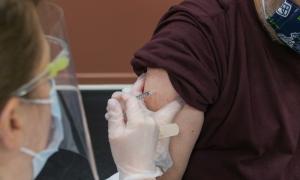Recommendations on vaccination of people with evidence of previous SARS-CoV-2 infection

The principal investigator of IrsiCaixa and member of the Multidisciplinary Collaborative Group for the Scientific Monitoring of COVID-19 (GCMSC), Julià Blanco, has coordinated the preparation of a statement that includes recommendations on the vaccination of people with evidence of SARS-CoV-2 infection.
Should we prioritise vaccination of people with documented SARS-CoV-2 infection?
The criteria for defining the distribution of vaccines among different population groups should be based on existing scientific knowledge. In the case of people with previous SARS-CoV-2 and/or COVID-19 infection, information is still limited, as all Phase III clinical studies of approved vaccines have been conducted in an uninfected population.
- Pfizer/Biontech (NCT04368728) excludes all persons diagnosed with COVID-19 either by microbiological data or clinical suspicion (Polack et al. 2020).
- Moderna (NCT04470427) excludes participants with a documented history of SARS-CoV-2 infection (Baden et al. 2020).
- Astra Zeneca (NCT04516746) excludes individuals with a laboratory-confirmed history of COVID-19, except for a small subgroup (Voysey et al. 2021).
Therefore, there is no solid scientific data to validate vaccination of the already infected population, and the logical conclusion is that it should not be recommended. The risk of this recommendation seems manageable given that we can consider that most people who have passed COVID-19 are protected against re-infection, at least for 6 months post-infection. A recent epidemiological study involving 12,364 healthcare workers with an average age of 38 years quantifies this protection at six months. The presence of antibodies is associated with 83% protection against active SARS-CoV-2 infection (PCR positivity during the study period), confirming the existence of protective immunity at levels comparable to those obtained by approved vaccines (Mahase, 2021).
Consistent with epidemiological data, different studies confirm the duration of neutralising antibody responses at least six months after infection. These antibodies show a rapid onset, a subsequent drop and stabilisation three months after infection, with half-lives of more than one year from this point, suggesting that immunity may be long-lasting. However, neutralising antibody titres are high in severely infected individuals, but a proportion of asymptomatic or mildly symptomatic individuals show low or undetectable levels after six months of infection (Pradenas et al. 2021).
Recommendation: although more evidence from different cohorts is desirable, these data support the repeated recommendation that persons with documented past COVID-19 infection should not be prioritised during vaccination campaigns (Sanjosé et al. 2020).
Tendremos que vacunar las personas que han pasado la COVID-19?
The lack of information on the duration of immunity produced by natural infection beyond six months post-infection and the comparative data with immunity achieved by vaccination, which is generally superior to that induced by natural infection, suggest that vaccination of infected persons would be desirable. But such vaccination would require only a single dose of vaccine (in vaccines where two doses are normally needed), which would be sufficient to ensure an optimal level of immunity.
- As discussed above, natural immunity against infection lasts for at least six months, although it may be weak in mild/asymptomatic cases. An immune booster would be desirable in these cases (which account for 90% of all cases).
- The levels of neutralising antibodies generated by vaccination are generally about five times higher than those generated by natural infection, arguing in favour of vaccination to optimise the response.
- Independent studies have suggested that a single dose of vaccine is sufficient to generate levels of immunity in patients with previous COVID-19 that would be higher than those achieved by two doses of vaccine in uninfected individuals:
- Krammer et al. describe increased reactogenicity and immunogenicity in a cohort of 231 individuals (Krammer et al. 2021).
- Saadat et al describe the immunogenicity of a single dose in a cohort of 107 individuals (Saadat et al. 2021).
- Stamatatos et al confirm these data and extend them to new variants in a group of 10 individuals (Stamatatos et al. 2021).
- In Europe, France was the first country to recommend a single dose of vaccine for people who have had COVID-19.
Recommendation: a single dose of vaccine after six months of documented infection (once the immune response is stabilised) would therefore appear to be the optimal schedule for persons with documented SARS-CoV-2 and/or COVID-19 infection. Specific studies in this population are absolutely necessary to define the optimal schedule.
Is it necessary to test the population before vaccination?
A direct consequence of these recommendations is the potential need for serological testing of the population prior to mass vaccination campaigns. Factors to be taken into account would be:
- The severely infected population with high immunity is fully identified and would be included in the single dose vaccination mentioned above.
- The population with asymptomatic/mild infection who do not know their serostatus have lower levels of protective immunity.
- Mass serological screening would not be cost-effective, would increase costs and delay the vaccination process, and there is to date no threshold value of protection or clear correlation between antibody level and certainty of protection.
- The protective immune response does not depend solely on antibodies, as the cellular response also plays an important role.
Recommendation: systematic screening would not be recommended at first.
You can see the references of the statement here.
This article was written by Julià Blanco, Silvia de Sanjosé, Josep M Miró, Quique Bassat, Magda Campins, Robert Guerri, Carles Brotons, Juana Díez, Mireia Sans, Olga Rubio, Adelaida Sarukhan, with the support of Antoni Plasència and Josep M Antó, from the Multidisciplinary Collaborative Group for the Scientific Monitoring of COVID-19.